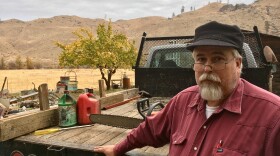Ashley Ahearn
-
In the past two years, more than 800,000 acres in northern Nevada have burned. The traditional sagebrush rangeland is being replaced by cheatgrass that burns hotter and more frequently.
-
A proposed fee of $15 per ton of carbon emissions in Washington state has several exemptions for large emitters, and has rural voters afraid they'll end up paying.
-
In a blow to the coal industry, a new terminal in the Pacific Northwest was denied approval after opposition from environmental groups and a debate between local Native American tribes.
-
As international leaders convene in Paris to talk about solutions for climate change, one tribe on the Washington coast reluctantly plans its retreat from the encroaching Pacific Ocean.
-
Over 1,600 acres of old-growth rainforest have burned in Washington's Olympic National Park. As Ashley Ahearn of KUOW reports, the wildfire is expected to persist through the rest of the summer.
-
The Forest Service is set to open more than 80,000 acres for clean, renewable geothermal power in Washington state. But environmentalists are worried about damage to streams and old-growth forests.
-
The Port of Seattle has leased space to Shell Oil to dock ships and store Arctic drilling rigs in the off season. City officials and environmentalists question that decision and want Shell out.
-
Once a booming timber area, Grays Harbor County is the site of three proposed oil terminals. The local fishing industry sees the uptick in oil movement as a big risk, with limited economic benefits.
-
Two dams blocked the river for more than 100 years. The lower dam is completely gone and the last 30 feet of the upper dam were blown up this week. Now, the river is returning to life.
-
Earlier this month, China imposed a ban on shellfish imports from most of the U.S. West Coast after finding two bad clams. The move is hitting Washington state particularly hard. State agencies estimate businesses there are losing as much as $600,000 a week.





